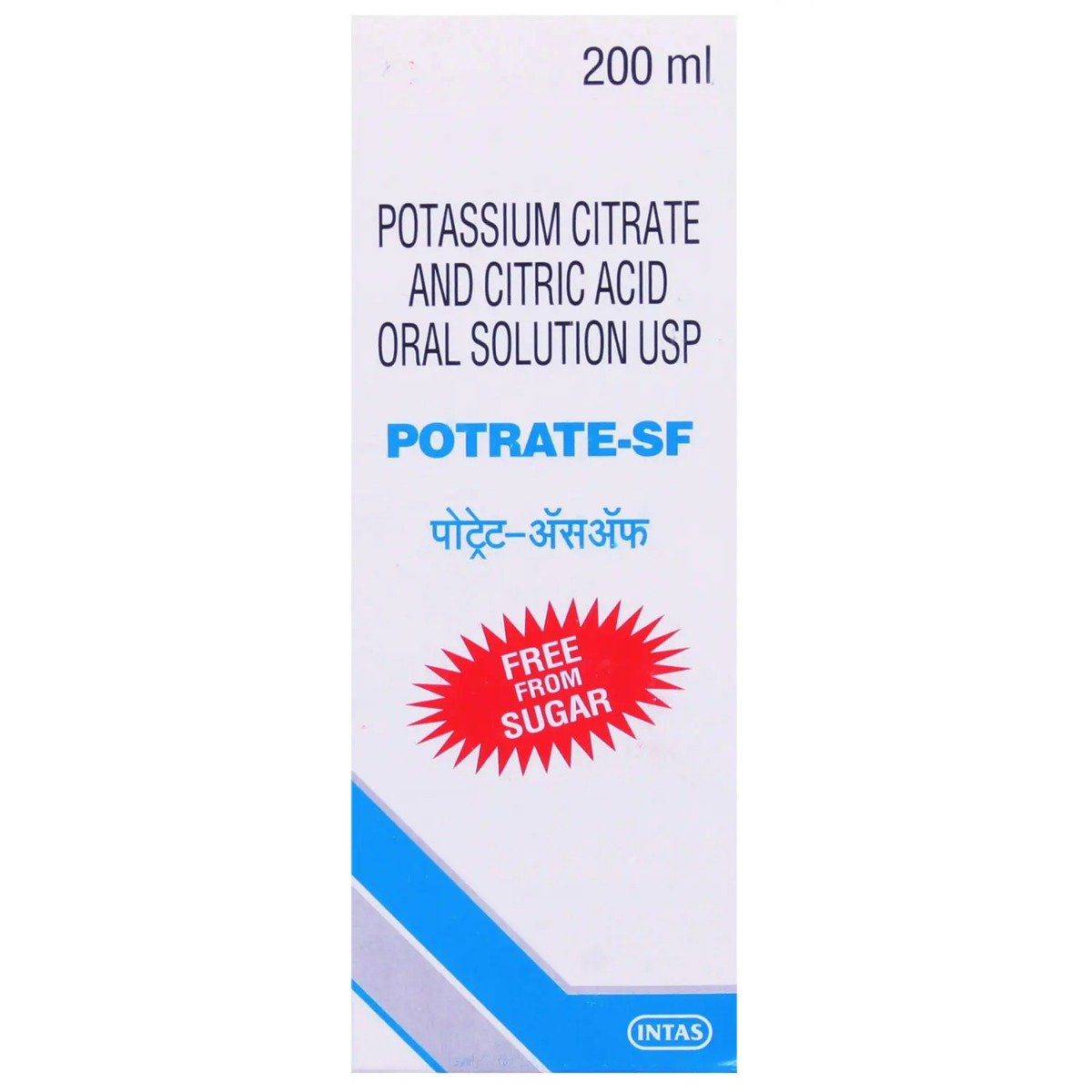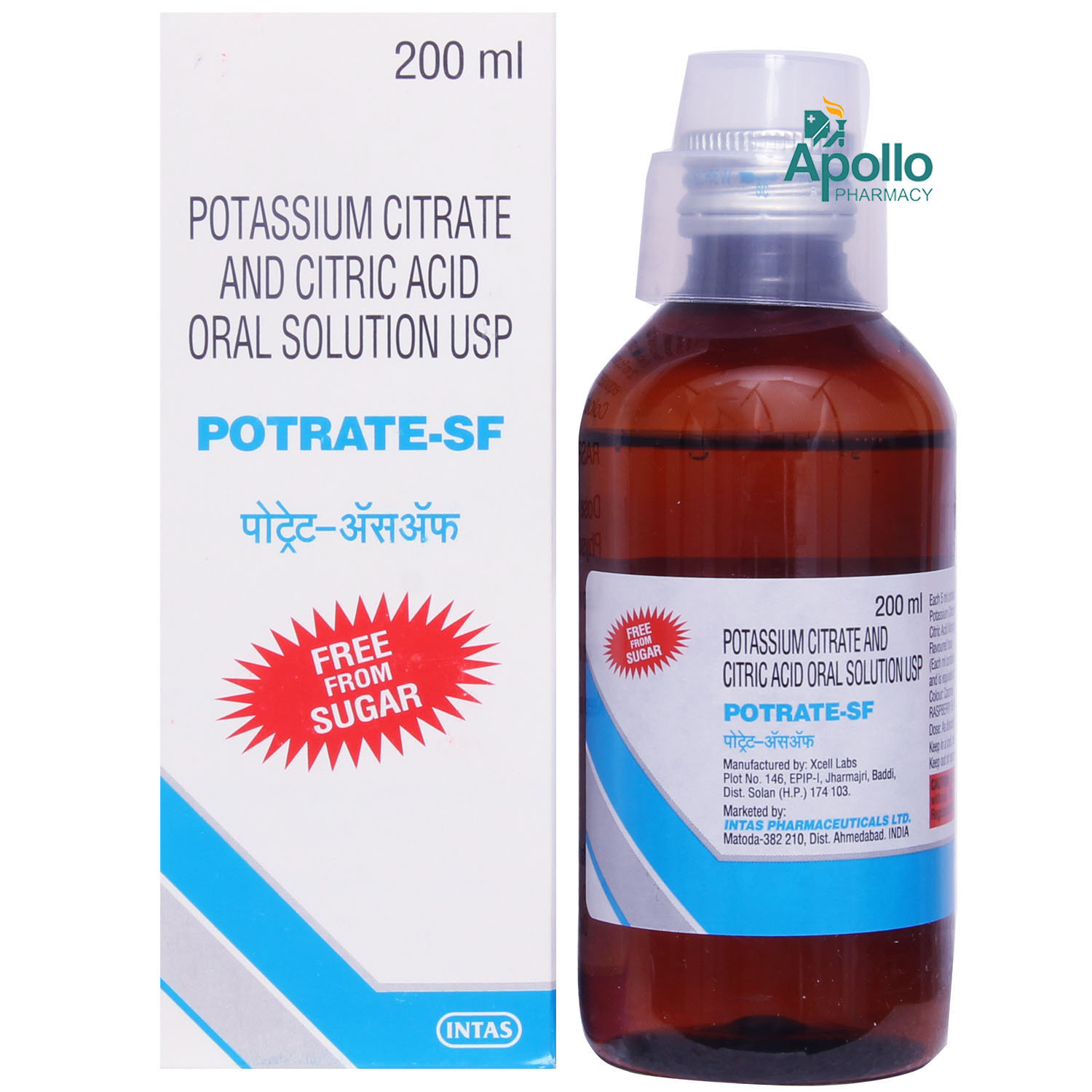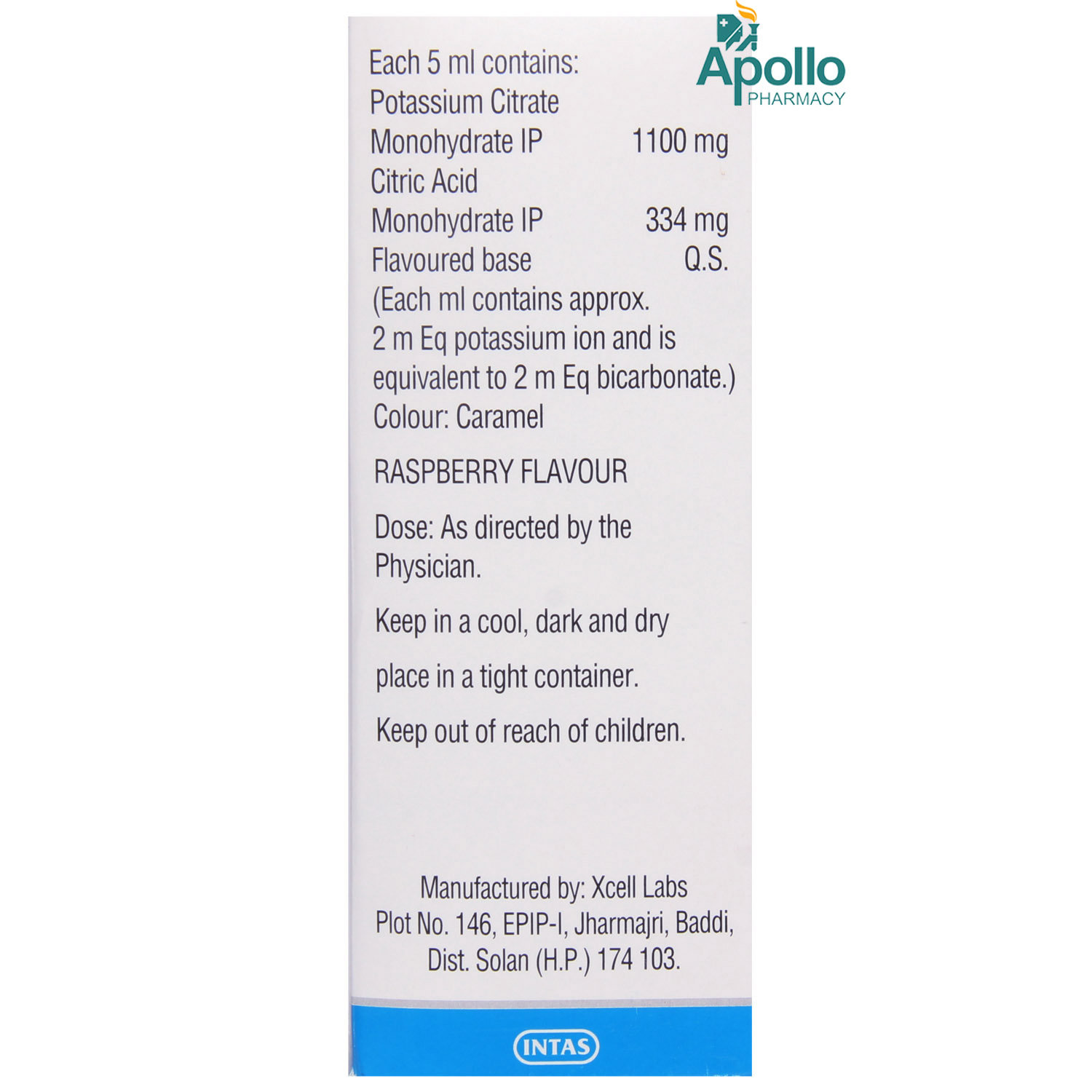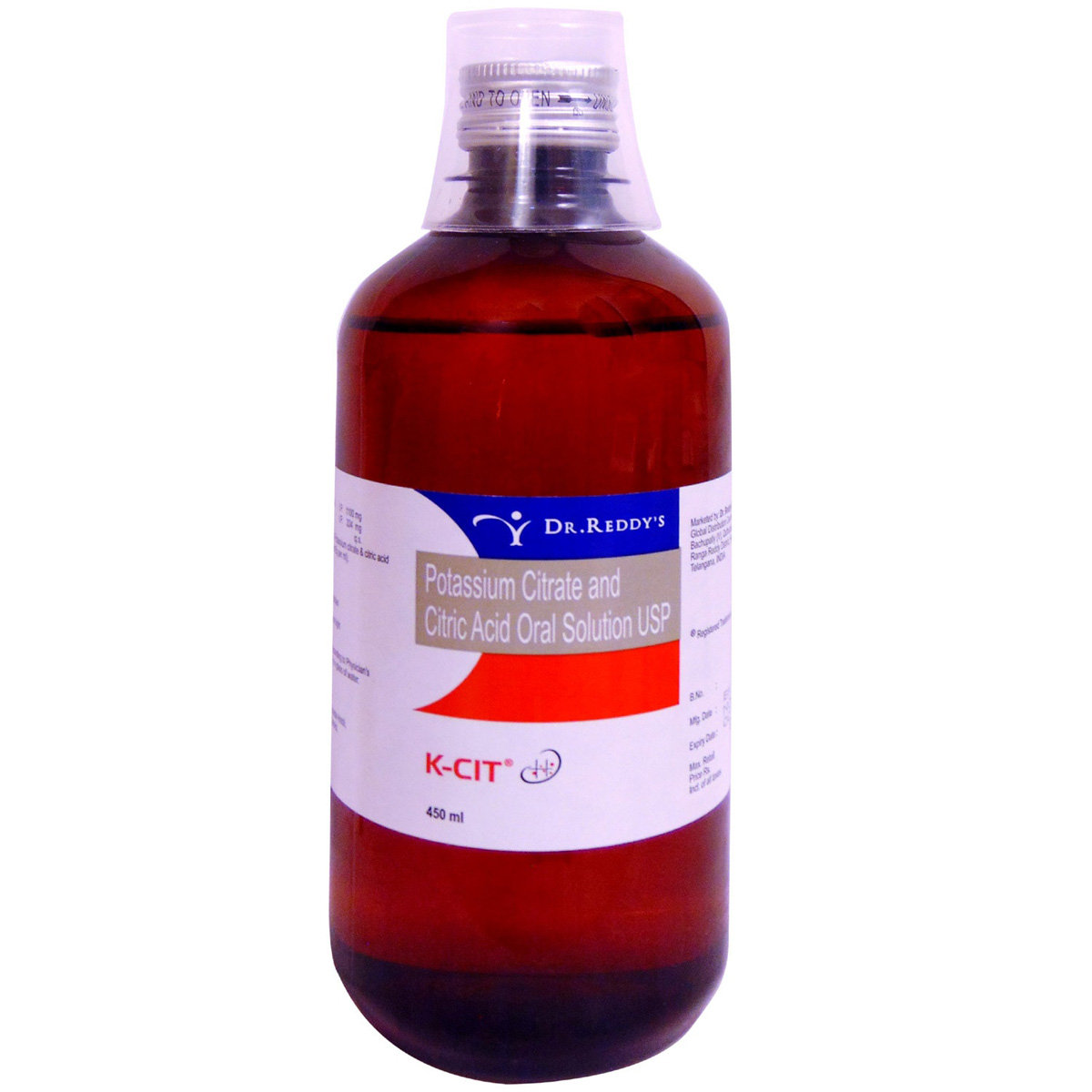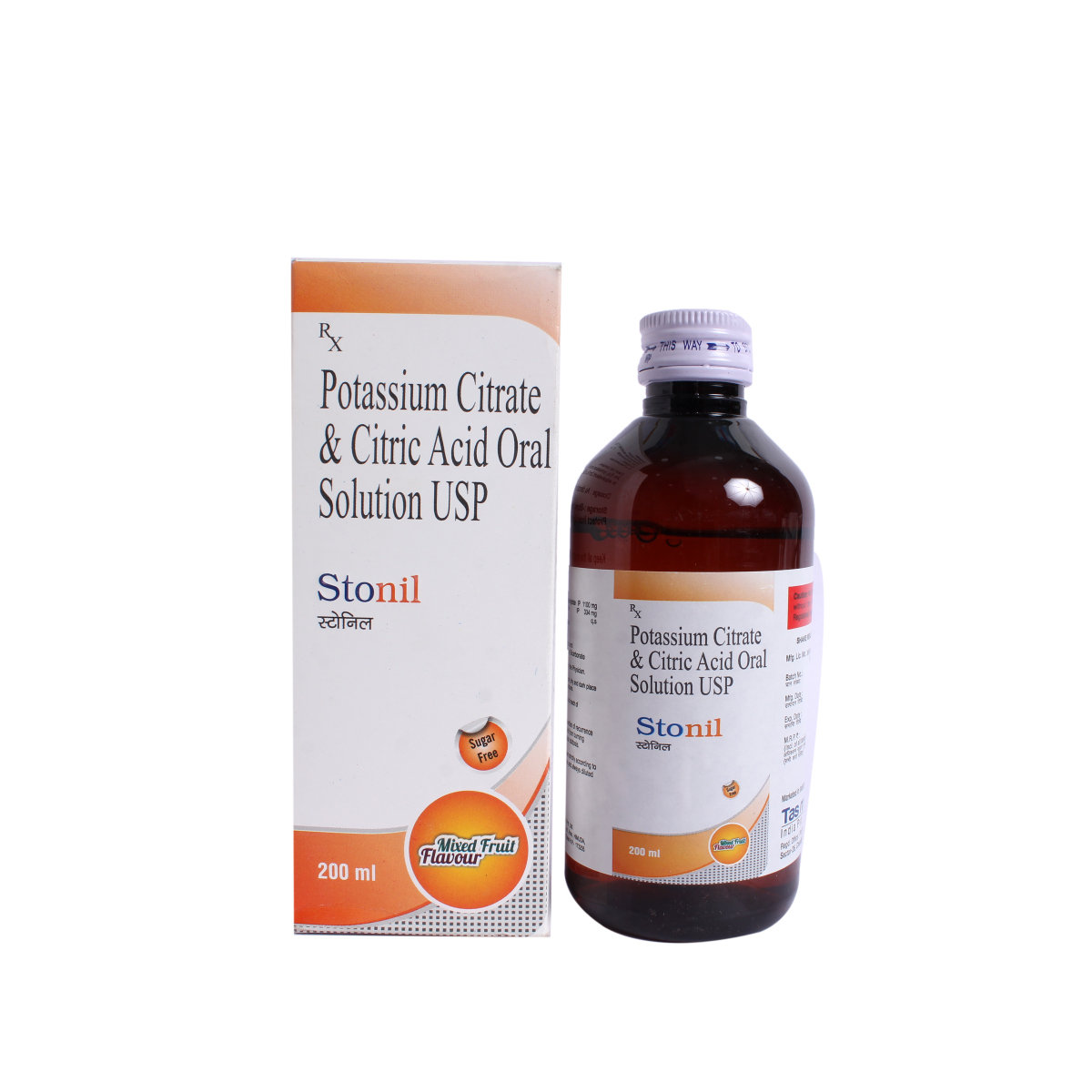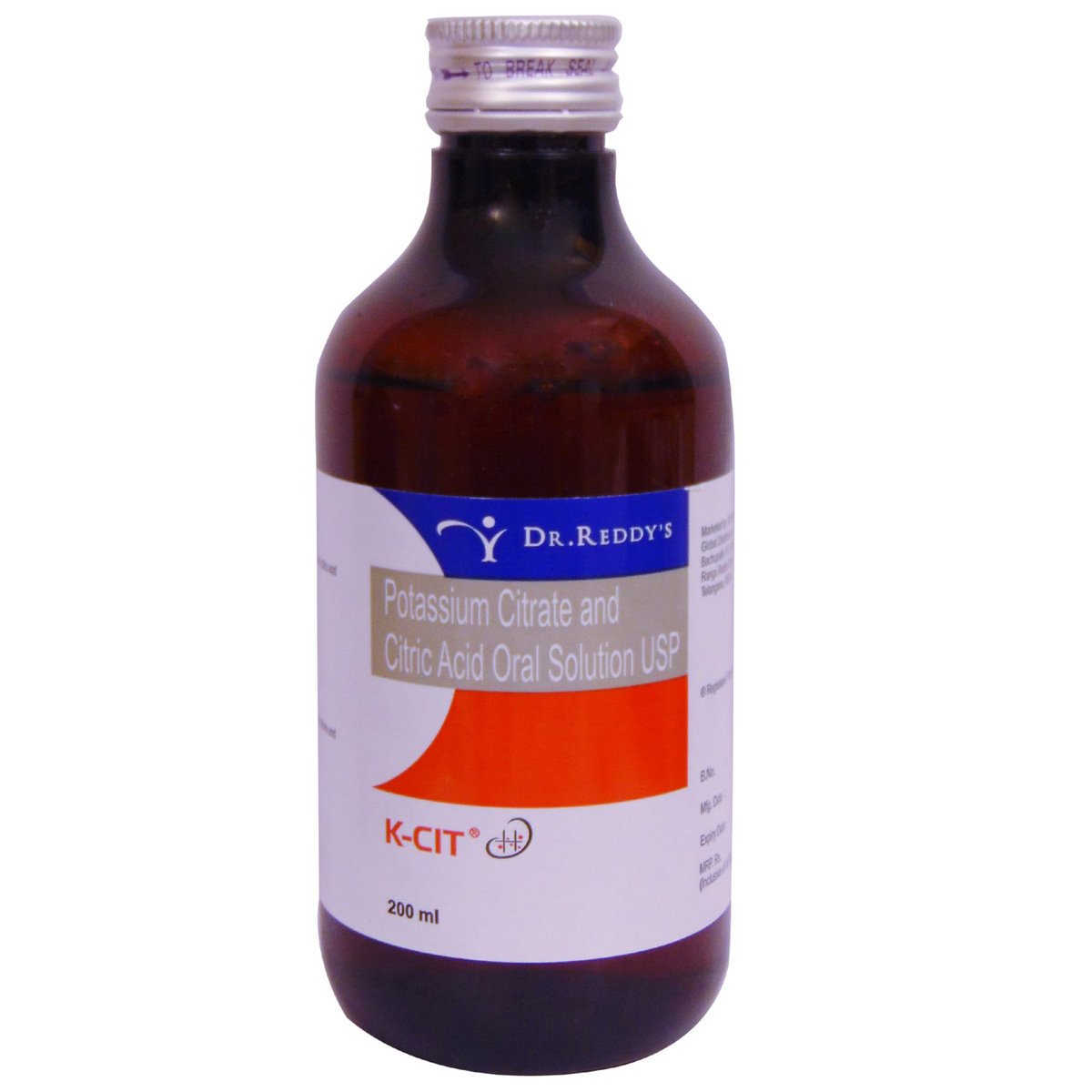Potrate-SF Oral Solution 200 ml
MRP ₹196.5
(Inclusive of all Taxes)
₹29.5 Cashback (15%)
Provide Delivery Location
Online payment accepted
 Prescription drug
Prescription drugWhats That
Composition :
Manufacturer/Marketer :
Consume Type :
Expires on or after :
Return Policy :
About Potrate-SF Oral Solution
Potrate-SF Oral Solution belongs to the class of medications called ‘alkalinizing agents’ used to prevent gout and kidney stones and treat metabolic acidosis in patients with kidney diseases. Gout is a type of arthritis in which uric acid crystals are deposited in the joints leading to severe pain, redness, and swelling. A kidney stone is a condition in which hard deposits are accumulated in the kidney forming stones. Metabolic acidosis is a condition in which excess acid is accumulated in the body due to kidney failure.
Potrate-SF Oral Solution combines two medicines: Citric acid and Potassium citrate. Citric acid prevents the formation of deposits by binding with the salts and also breaks down the small deposits that are beginning to form. Potassium citrate is alkaline in nature and works by neutralizing the acids in the blood and urine, thereby preventing the accumulation of salts in the body.
Potrate-SF Oral Solution is available in the form of oral liquid. You should take this medicine as prescribed by your doctor. Potrate-SF Oral Solution may cause side effects such as diarrhoea, stomach upset, nausea, and vomiting. These side effects are mild and temporary. However, inform your doctor if any of these side effects persist or get worsen.
To treat your condition, continue taking Potrate-SF Oral Solution for as long as your doctor has prescribed it. Do not take Potrate-SF Oral Solution if you are allergic to Citric acid, potassium citrate, or other ingredients. Inform your doctor if you are pregnant or breastfeeding before taking the Potrate-SF Oral Solution . It should not be used in patients with severe kidney failure, severe heart damage, severe dehydration, heat cramps, Addison’s disease (an adrenal gland disorder), or hyperkalemia (high blood potassium levels). Potrate-SF Oral Solution should not be given to children unless prescribed by a doctor. Avoid alcohol consumption while taking Potrate-SF Oral Solution as it might increase certain side-effects. Keep your doctor informed about all the medicines you are taking and your health condition to rule out any unpleasant side effects.
Uses of Potrate-SF Oral Solution
Directions for Use
Key Benefits
Potrate-SF Oral Solution is a combination of two medicines: Citric acid and Potassium citrate, primarily used to prevent gout and kidney stones and treat metabolic acidosis in patients with kidney diseases. Citric acid prevents the formation of deposits by binding with the salts and also breaks down the small deposits that are beginning to form. Potassium citrate is alkaline in nature and works by neutralizing the acids in the blood and urine. Potrate-SF Oral Solution effectively reduces the crystallization of stone-forming salts such as calcium oxalate (in kidney stones) and uric acid (in gout).
Storage
Drug Warnings
Potrate-SF Oral Solution should be used with caution in patients with fluid loss (dehydration), heat cramps, high potassium levels, a certain problem that causes periods of muscle weakness (adynamia episodica hereditaria), kidney disease, heart disease, unable to pass urine, or untreated Addison's disease, toxaemia of pregnancy (high blood pressure during pregnancy), oedema (swelling), and chronic diarrhoea. Do not take antacids without consulting your doctor while using Potrate-SF Oral Solution , as it may lead to electrolyte imbalances. Potrate-SF Oral Solution should not be used in pregnancy or breastfeeding unless the doctor has told you to do so. Do not take food containing potassium supplements or other products that contain potassium, as they may worsen your condition. Stop using Potrate-SF Oral Solution and consult a doctor immediately if you notice muscle twitching, swelling, weakness, mood changes, weight gain, increased heart rate, black or tarry stools, severe diarrhoea, or convulsions (fits) while using Potrate-SF Oral Solution .
Drug-Drug Interactions
Drug-Drug Interactions
Login/Sign Up
Taking Clemastine and Potrate-SF Oral Solution 200 ml (in tablet or capsule form) together can increase the risk of stomach ulcers, bleeding, and other gastrointestinal injury.
How to manage the interaction:
Taking Clemastine with Potrate-SF Oral Solution 200 ml is not recommended, as it may lead to an interaction but can be taken if prescribed by the doctor. However, if you experience severe stomach pain, bloating, sudden lightheadedness or dizziness, nausea, vomiting (especially with blood), decreased hunger, or dark, tarry stools, consult the doctor immediately. Do not discontinue any medications without a doctor's advice.
Taking Orphenadrine and Potrate-SF Oral Solution 200 ml (in tablet or capsule form) together can increase the risk of stomach ulcers, bleeding, and gastrointestinal injury.
How to manage the interaction:
Taking Orphenadrine (citrate) with Potrate-SF Oral Solution 200 ml is not recommended, as it may lead to an interaction, it can be taken if prescribed by the doctor. However, if you experience severe stomach pain, bloating, sudden lightheadedness or dizziness, nausea, vomiting (especially with blood), decreased hunger, or dark, tarry stools, consult the doctor immediately. Do not discontinue any medications without a doctor's advice.
Taking Potrate-SF Oral Solution 200 ml and trospium together can increase the risk of stomach ulcers, bleeding, and gastrointestinal injury.
How to manage the interaction:
Taking Trospium with Potrate-SF Oral Solution 200 ml is not recommended as it may lead to an interaction, it can be taken if prescribed by the doctor. However, if you experience severe stomach pain, bloating, sudden lightheadedness or dizziness, nausea, vomiting (especially with blood), decreased hunger, or dark, tarry stools, consult the doctor immediately. Do not discontinue any medications without a doctor's advice.
Co-administration of Glycopyrrolate with Potrate-SF Oral Solution 200 ml can increase the risk or severity of ulcers, bleeding, and other gastrointestinal injury.
How to manage the interaction:
Taking Glycopyrrolate with Potrate-SF Oral Solution 200 ml together is not recommended as it can result in an interaction, it can be taken if a doctor has advised it. However, if you experience severe abdominal pain, bloating, sudden dizziness or lightheadedness, nausea, vomiting (especially with blood), loss of appetite, and/or black, tarry stools, contact a doctor immediately. Do not discontinue any medications without consulting a doctor.
Taking Procyclidine and Potrate-SF Oral Solution 200 ml together can increase the risk of stomach ulcers, bleeding, and gastrointestinal injury.
How to manage the interaction:
Taking procyclidine with Potrate-SF Oral Solution 200 ml is not recommended, but it can be taken together if advised by your doctor. However, if you experience severe stomach pain, bloating, sudden lightheadedness or dizziness, nausea, vomiting (especially with blood), decreased hunger, or dark, tarry stools, consult the doctor immediately. Do not discontinue any medications without a doctor's advice.
Taking Cyproheptadine and Potrate-SF Oral Solution 200 ml (in tablet or capsule form) together can increase the risk of stomach ulcers.
How to manage the interaction:
Taking Cyproheptadine with Potrate-SF Oral Solution 200 ml is not recommended, as it may lead to an interaction but can be taken if prescribed by the doctor. However, if you experience severe stomach pain, bloating, sudden lightheadedness or dizziness, nausea, vomiting (especially with blood), decreased hunger, or dark, tarry stools, consult the doctor immediately. Do not discontinue any medications without a doctor's advice.
Taking Disopyramide and Potrate-SF Oral Solution 200 ml together can increase the risk of stomach ulcers, bleeding, and gastrointestinal injury.
How to manage the interaction:
Although taking Disopyramide and Potrate-SF Oral Solution 200 ml together is not recommended as it may lead to an interaction, it can be taken if prescribed by the doctor. However, if you experience severe stomach pain, bloating, sudden lightheadedness or dizziness, nausea, vomiting (especially with blood), decreased hunger, or dark, tarry stools, consult the doctor immediately. Do not discontinue any medications without a doctor's advice.
Coadministration of Oxybutynin and Potrate-SF Oral Solution 200 ml can increase the risk of developing stomach ulcers or bleeding.
How to manage the interaction:
Taking Oxybutynin with Potrate-SF Oral Solution 200 ml is generally avoided as it may lead to an interaction, it can be taken if prescribed by the doctor. Consult the doctor immediately if you experience severe stomach pain, bloating, lightheadedness, dizziness, vomiting (especially with blood), decreased hunger, or dark stools. Do not discontinue any medications without a doctor's advice.
Taking Biperiden and Potrate-SF Oral Solution 200 ml (in tablet or capsule form) together can increase the risk of stomach ulcers, bleeding, and other gastrointestinal injury.
How to manage the interaction:
Taking Biperiden with Potrate-SF Oral Solution 200 ml is not recommended, as it may lead to an interaction but can be taken if prescribed by the doctor. However, if you experience severe stomach pain, bloating, sudden lightheadedness or dizziness, nausea, vomiting (especially with blood), decreased hunger, or dark, tarry stools, consult the doctor immediately.
Taking Dicyclomine and Potrate-SF Oral Solution 200 ml together can increase the risk of stomach ulcers, bleeding, and gastrointestinal injury.
How to manage the interaction:
Taking Dicyclomine with Potrate-SF Oral Solution 200 ml is not recommended, as it may lead to an interaction, it can be taken if prescribed by the doctor. However, if you experience severe stomach pain, bloating, sudden lightheadedness or dizziness, nausea, vomiting (especially with blood), decreased hunger, or dark, tarry stools, consult the doctor immediately. Do not discontinue any medications without a doctor's advice.
Drug-Food Interactions
Drug-Food Interactions
Login/Sign Up
Diet & Lifestyle Advise
- Drink plenty of fluids.
- Limit consumption of spinach, wheat bran, nuts, beets, and dairy products.
- Avoid high salt intake and foods containing baking soda.
- Do not take vitamin C and calcium supplements without your doctor’s advice.
- Physical activity helps strengthen muscles and relieves joint stiffness. Gentle activities like 20-30minutes of walking or swimming would be helpful.
- Performing yoga may also help in improving joint flexibility and pain management.
- Maintain a healthy weight by performing regular low-strain exercises and eating healthy food.
- Get adequate sleep, as resting the muscles can help reduce inflammation and swelling.
- Follow heat or cold therapy, and apply a cold or hot compress on the joints for 15-20minutes regularly.
- De-stress yourself by meditating, reading books, taking a warm bubble bath or listening to soothing music.
- Acupuncture, massage and physical therapy may also be helpful.
- Eat food rich in antioxidants such as berries, spinach, kidney beans, dark chocolate, etc.
- Foods containing flavonoids help in reducing inflammation. These include soy, berries, broccoli, grapes and green tea.
- Avoid smoking and alcohol consumption.
Side Effects of Potrate-SF Oral Solution
- Nausea
- Vomiting
- Diahrrea
- Stomach upset
- Black, tarry, or bloody stools
Habit Forming
Therapeutic Class
All Substitutes & Brand Comparisons
RX
K-Cit Oral Solution 450 ml
Dr Reddy's Laboratories Ltd
₹259.5
(₹0.52/ 1ml)
40% CHEAPERRX
Stonil Oral Solution 200 ml
Tas Med India Pvt Ltd
₹120.5
(₹0.54/ 1ml)
38% CHEAPERRX
K-Cit Oral Solution 200 ml
Dr Reddy's Laboratories Ltd
₹176.5
(₹0.79/ 1ml)
10% CHEAPER
Author Details
We provide you with authentic, trustworthy and relevant information
Drug-Diseases Interactions
Drug-Diseases Interactions
Login/Sign Up
FAQs
Drug-Drug Interactions Checker List
- ALUMINUM CARBONATE
- ALUMINUM HYDROXIDE
- ASPIRIN
- LITHIUM
- METHENAMINE
- QUINIDINE
- TRIAMTERENE
- SPIRONOLACTONE
- AMILORIDE
- DIPHENHYDRAMINE
- BROMPHENIRAMINE
- ENALAPRIL
- CAPTOPRIL
- FOSINOPRIL
- AMITRIPTYLINE
- AMOXAPINE
- DOXEPIN
- IMIPRAMINE
- SOLIFENACIN
- DARIFENACIN
Special Advise
- Following a specific diet plan created by your nutritionist to control your health condition is essential.
- Your doctor may advise you to take blood and urine tests while using Potrate-SF Oral Solution to examine your health condition and ensure that this medicine treats your condition.
Disease/Condition Glossary
Gout: Gout is a type of arthritis in which patients experience severe pain, redness, and swelling in joints. The most common affected area is the joint at the base of the big toe. Patients with gout may often experience acute attacks that result in sudden and severe pain. It occurs due to a condition called hyperuricemia (high uric acid levels in the body). The excess uric acid deposit and crystallize in the joints leading to pain and inflammation.
Kidney stones: It is a condition in which hard deposits occur in the kidney leading to stones. A kidney stone comprises mainly four types of calcium oxalate, uric acid, struvite, and cystine. It is due to the increased level of uric acid in the body. As a result, uric acid crystals start depositing in the kidney, known as renal calculi/nephrolithiasis/urolithiasis.
Metabolic acidosis: Metabolic acidosis is a condition in which excess acid is accumulated in the body due to the kidney's inability to remove excess acid from the body. It can be of various types, such as lactic acidosis (build-up of lactic acid), diabetic acidosis (build-up of ketone bodies), and hyperchloremic acidosis (build-up of sodium bicarbonate). It is mostly seen in patients with kidney impairment.

Have a query?
Alcohol
Safe if prescribed
Alcohol consumption may worsen your health condition.
Pregnancy
Consult your doctor
Potrate-SF Oral Solution is a pregnancy category C drug. It should not be taken until prescribed. Your doctor will weigh the benefits and potential risks before prescribing them. Please consult your doctor.
Breast Feeding
Consult your doctor
There is limited data on how Potrate-SF Oral Solution affects breastfeeding. Please consult your doctor before taking Potrate-SF Oral Solution . Your doctor will weigh the benefits and potential risks before prescribing them.
Driving
Safe if prescribed
Potrate-SF Oral Solution may not affect your ability to drive.
Liver
Consult your doctor
Potrate-SF Oral Solution can be used in patients with liver diseases if prescribed.
Kidney
Consult your doctor
Potrate-SF Oral Solution should be used with caution in patients with kidney diseases. Dose adjustments may be necessary.
Children
Safe if prescribed
The safety and effectiveness of Potrate-SF Oral Solution in children have not been established. Please consult your doctor before giving Potrate-SF Oral Solution to children.

